过去进行时语法讲解
- 格式:ppt
- 大小:472.50 KB
- 文档页数:18
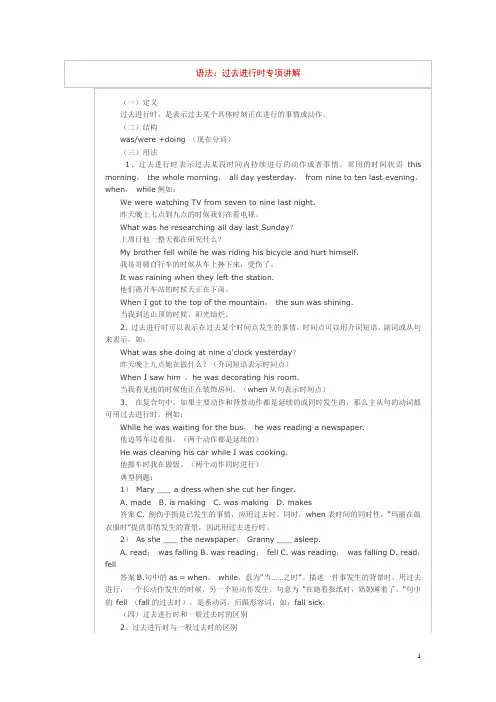
一、用动词的适当形式填空1. While we __________ (wait) for the bus, a girl __________ (run) up to us.2. I __________ (telephone) a friend when Bob __________ (come) in.3. Jim __________ (jump) on the bus as it __________ (move) away.4. We __________ (test) the new machine when the electricity __________ (go) off.5. She __________ (not want) to stay in bed while the others ________________ (all, work) in the fields.6. While mother ________ (put) Cathy to bed, the door bell ________ (ring).7. As I __________ (walk) in the park, it __________ (begin) to rain.8. Even when she ___________ (be) a child she ________________ (already, think) of becominga ballerina (芭蕾舞演员).9. It was quite late at night. George __________ (read) and Amy __________ (ply) her needle when they __________ (hear) a knock at the door.10. There __________ (be) a group round the fire when they __________ (reach) it. An old woman __________ (sit) on the ground near the kettle; two small children __________ (lie) near her;a donkey __________ (bend) his head over a tall girl.11. I _____ (have) my breakfast at half past six yesterday morning.12. Mary _____ (go) over her lessons from six to seven last night. John and peter ____(do) the same thing.13. What _____ you ___ (do) at that time? We _____ (watch) TV.14. Was your father at home yesterday evening? Yes ,he was. He _____ (listen) to the radio.15. They _____(not make) a model ship when I saw him.16. _____ they ____ (have) a meeting at 4 yesterday afternoon?No, they _____. They _____ (clean) the classroom.17. ______ it ______(rain) when you left school? Yes, it ____. (No, it ____)18. What _____ your father _____ (do) when he was your age?19. One day, Edison _____ (wait) for a train to arrive, and suddenly a little boy ran to the track(轨道) to play.20. He asked me if I ______ (go) fishing that afternoon.21. The three of them were in a hurry because their plane _____ (leave) in five minutes.22. In a letter, john told us that he _____ (come) to china next month.23. When the bell rang, jenny _____ (wait) in her seat.24. She _____ (make) her dress the whole afternoon.25. While my father ____ (look) through the evening paper, he suddenly ____ a cry.26. When I ____ (come) in the room, he ____ (see) me, for he ____ (read) something27. When we _____ (arrive) at the village, it _____ (get) dark and it _____ (rain) hard.28. I _____ (know) you ____(wait) for me here.29. One day a little monkey ____(play) in a tall tree. A mother crocodile(鳄鱼) ____ (look) for food near the bank.30. What ____ your father ____ (do) yesterday evening? He ____ (study) at the evening school.31. Later his parents found that he _____ (sit) on some eggs.32. When he knocked at the door, my aunt ____ (cook)33. The students ______ (sing) and ____ (dance) happily on the playground at that time.34. I ____ (write) a letter when the door bell rang.35. We had no classed at that time. We ____ (plant) trees.二、选择题1.I ______ cooked a meal when you _____ me.a. cooked, were ringingb. was cooking, rangc. was cooking, were ringingd. cooked, rang2.He said he _____ to draw a plane on the blackboard at that time.a. triesb. triedc. was tryingd. will try3.While she ______ TV, she ______ a sound outside the room.a. was watching, was hearingb. watched, was hearingc. watched, heardd. was watching, heard4.They _____ a football game from 7 to 9 last night.a. were watchingb. watchc. watchedd. are watching5.What book ____ you ______ when I ____ you at four yesterday afternoon?a. did, read, was seeingb. did, read, sawc. were, reading, sawd. were, reading, was seeing6.It was Friday evening. Mr and Mrs. Green _____ ready to fly to England.a. are gettingb. getc. were gettingd. got7.Lei Feng _____ always _____ of others when he ______ in the army.a. is, thinking, wasb. was, thinking, isc. did, think, isd. was, thinking, was8.A girl ______ my pen fall off the table when she _____ me.a. saw, passedb. was seeing, passedc. was seeing, passedd. was seeing, was passing9.We ____ for tom at ten last Sunday. He often kept us ______.a. were waiting, waitingb. were waiting, waitc. waited, waitingd. waited, wait10.He ____ his father on the farm the whole afternoon last Saturday.a. helpsb. would helpc. was helpingd. is helping11.While mother _______ some washing, I _____ a kite for Kate.a. did, madeb. was doing, madec. was doing, was makingd. did, was making12."_______ you angry then?" "they ______ too much noise."a. are, were makingb. were, were makingc. are, maded. were, made13.He ____ some cooking at that time, so _____ mea. did, heardb. did, didn't hearc. was doing, heardd. was doing, didn't hear14.This time yesterday jack _____ his bike. He _____ TVa. repaired, didn't watchb. was repairing, watchedc. repaired, watchedd. was repairing, wasn't watching15.His parents wanted to know how he _____ on with his new classmates.a. was gettingb. getsc. is gettingd. will get。
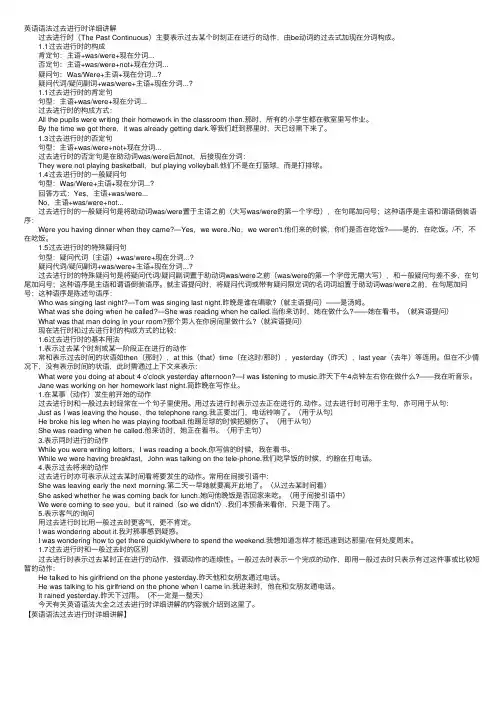
英语语法过去进⾏时详细讲解 过去进⾏时(The Past Continuous)主要表⽰过去某个时刻正在进⾏的动作,由be动词的过去式加现在分词构成。
1.1过去进⾏时的构成 肯定句:主语+was/were+现在分词... 否定句:主语+was/were+not+现在分词... 疑问句:Was/Were+主语+现在分词...? 疑问代词/疑问副词+was/were+主语+现在分词...? 1.1过去进⾏时的肯定句 句型:主语+was/were+现在分词... 过去进⾏时的构成⽅式: All the pupils were writing their homework in the classroom then.那时,所有的⼩学⽣都在教室⾥写作业。
By the time we got there,it was already getting dark.等我们赶到那⾥时,天已经⿊下来了。
1.3过去进⾏时的否定句 句型:主语+was/were+not+现在分词... 过去进⾏时的否定句是在助动词was/were后加not,后接现在分词: They were not playing basketball,but playing volleyball.他们不是在打篮球,⽽是打排球。
1.4过去进⾏时的⼀般疑问句 句型:Was/Were+主语+现在分词...? 回答⽅式:Yes,主语+was/were... No,主语+was/were+not... 过去进⾏时的⼀般疑问句是将助动词was/were置于主语之前(⼤写was/were的第⼀个字母),在句尾加问号;这种语序是主语和谓语倒装语序: Were you having dinner when they came?—Yes,we were./No,we weren't.他们来的时候,你们是否在吃饭?——是的,在吃饭。
/不,不在吃饭。
1.5过去进⾏时的特殊疑问句 句型:疑问代词(主语)+was/were+现在分词...? 疑问代词/疑问副词+was/were+主语+现在分词...? 过去进⾏时的特殊疑问句是将疑问代词/疑问副词置于助动词was/were之前(was/were的第⼀个字母⽆需⼤写),和⼀般疑问句差不多,在句尾加问号;这种语序是主语和谓语倒装语序。
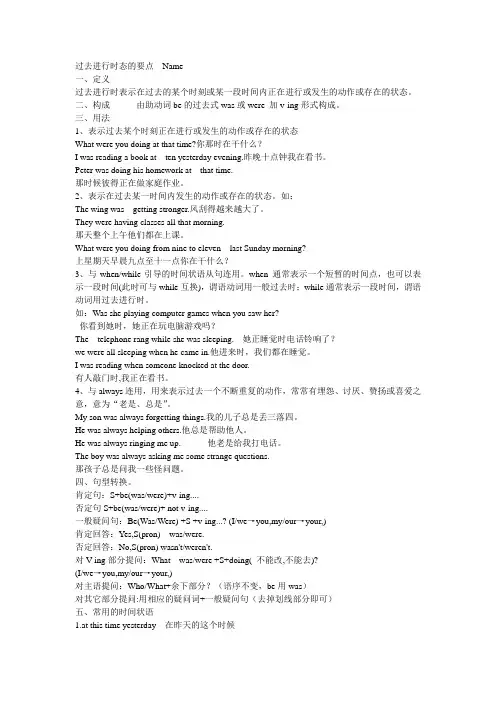
过去进行时态的要点Name____________一、定义过去进行时表示在过去的某个时刻或某一段时间内正在进行或发生的动作或存在的状态。
二、构成由助动词be的过去式was或were 加v-ing形式构成。
三、用法1、表示过去某个时刻正在进行或发生的动作或存在的状态What were you doing at that time?你那时在干什么?I was reading a book at ten yesterday evening.昨晚十点钟我在看书。
Peter was doing his homework at that time.那时候彼得正在做家庭作业。
2、表示在过去某一时间内发生的动作或存在的状态。
如:The wing was getting stronger.风刮得越来越大了。
They were having classes all that morning.那天整个上午他们都在上课。
What were you doing from nine to eleven last Sunday morning?上星期天早晨九点至十一点你在干什么?3、与when/while引导的时间状语从句连用。
when 通常表示一个短暂的时间点,也可以表示一段时间(此时可与while互换),谓语动词用一般过去时;while通常表示一段时间,谓语动词用过去进行时。
如:Was she playing computer games when you saw her?你看到她时,她正在玩电脑游戏吗?The telephone rang while she was sleeping. 她正睡觉时电话铃响了?we were all sleeping when he came in.他进来时,我们都在睡觉。
I was reading when someone knocked at the door.有人敲门时,我正在看书。
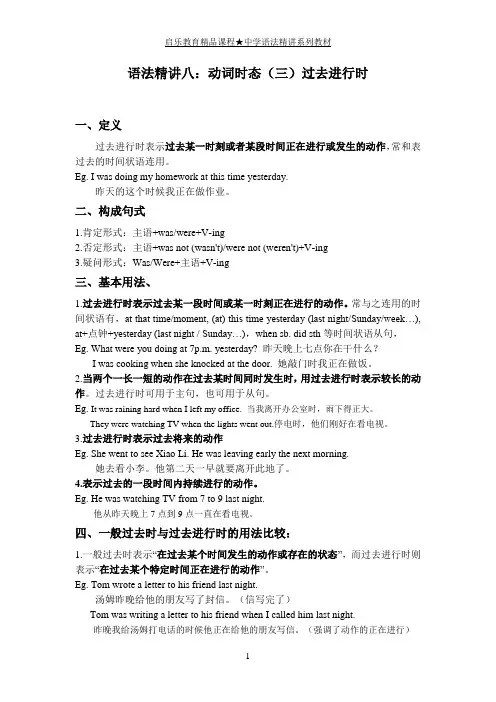
语法精讲八:动词时态(三)过去进行时一、定义过去进行时表示过去某一时刻或者某段时间正在进行或发生的动作,常和表过去的时间状语连用。
Eg. I was doing my homework at this time yesterday.昨天的这个时候我正在做作业。
二、构成句式1.肯定形式:主语+was/were+V-ing2.否定形式:主语+was not (wasn't)/were not (weren't)+V-ing3.疑问形式:Was/Were+主语+V-ing三、基本用法、1.过去进行时表示过去某一段时间或某一时刻正在进行的动作。
常与之连用的时间状语有,at that time/moment, (at) this time yesterday (last night/Sunday/week…), at+点钟+yesterday (last night / Sunday…),when sb. did sth等时间状语从句,Eg. What were you doing at 7p.m. yesterday? 昨天晚上七点你在干什么?I was cooking when she knocked at the door. 她敲门时我正在做饭。
2.当两个一长一短的动作在过去某时间同时发生时,用过去进行时表示较长的动作。
过去进行时可用于主句,也可用于从句。
Eg. It was raining hard when I left my office. 当我离开办公室时,雨下得正大。
They were watching TV when the lights went out.停电时,他们刚好在看电视。
3.过去进行时表示过去将来的动作Eg. She went to see Xiao Li. He was leaving early the next morning.她去看小李。
他第二天一早就要离开此地了。
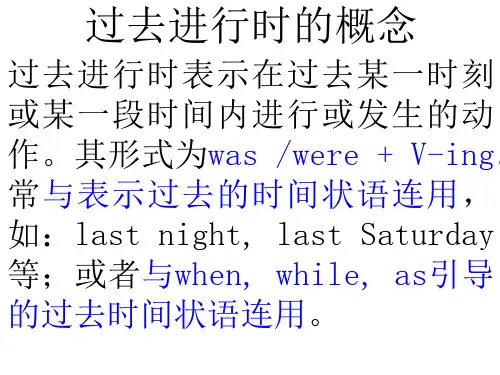
过去进行时的概念过去进行时表示在过去某一时刻或某一段时间内进行或发生的动作。
其形式为was/were+V-ing。
常与表示过去的时间状语连用,如:last night,last Saturday 等;或者与when,while,as引导的过去时间状语连用。
过去进行时的结构1.过去进行时由“主语+was/were+现在分词”构成。
例如:W e w e r e h a v i n g supper when the phone rang.2.过去进行时的否定式由“主语+was/were not+现在分词”构成。
例如:This time yesterday Jack was not watching TV.He was repairing his bike.3.过去进行时的疑问式由“was/were+主语+现在分词”构成。
例如:Were you playing basketball at four yesterday afternoon?过去进行时与一般过去时的比较1.一般过去时往往表示某一动作已经完成,而过去进行时却表示动作在持续或未完成。
(延续性动词)She wrote a letter to her friend last night.(信写完了)She was writing a letter to her friend last night.(信不一定写完)2、一般过去时表示只做一次动作,而过去进行时却表示动作反复地进行。
(短暂性动词)例句:She waved to me.她朝我挥了挥手。
3、句中有a moment ago之类的短语一般用一般过去时。
4、句中有at this time last Sunday,from8 to9yesterday之类的状语一般用过去进行时。
过去进行时可以用来代替一般过去时,表示更为偶然而非预定的动作:I was talking to Tom the other day.注释:这里的过去进行时给人的印象是这一动作既不特殊,也不引人注目。
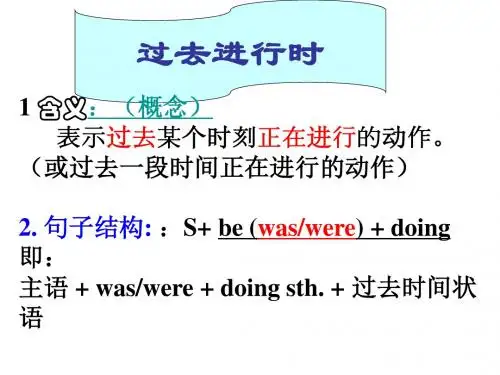
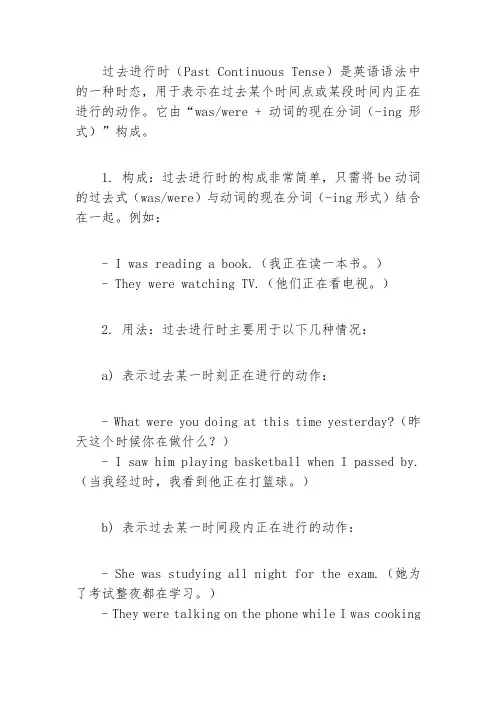
过去进行时(Past Continuous Tense)是英语语法中的一种时态,用于表示在过去某个时间点或某段时间内正在进行的动作。
它由“was/were + 动词的现在分词(-ing形式)”构成。
1. 构成:过去进行时的构成非常简单,只需将be动词的过去式(was/were)与动词的现在分词(-ing形式)结合在一起。
例如:- I was reading a book.(我正在读一本书。
)- They were watching TV.(他们正在看电视。
)2. 用法:过去进行时主要用于以下几种情况:a) 表示过去某一时刻正在进行的动作:- What were you doing at this time yesterday?(昨天这个时候你在做什么?)- I saw him playing basketball when I passed by.(当我经过时,我看到他正在打篮球。
)b) 表示过去某一时间段内正在进行的动作:- She was studying all night for the exam.(她为了考试整夜都在学习。
)- They were talking on the phone while I was cookingdinner.(我在做晚饭的时候,他们在打电话。
)c) 表示过去某一动作发生的背景或同时发生的另一个动作:- He was listening to music while he was working.(他在工作时听音乐。
)- She was reading a magazine when the phone rang.(电话响的时候,她正在看杂志。
)3. 注意事项:a) 当表示过去某一时刻正在进行的动作时,通常与表示过去的时间状语连用,如yesterday, last night, in 1990等。
b) 当表示过去某一时间段内正在进行的动作时,通常与表示过去的时间状语连用,如from 7 to 9 last night, all day yesterday等。
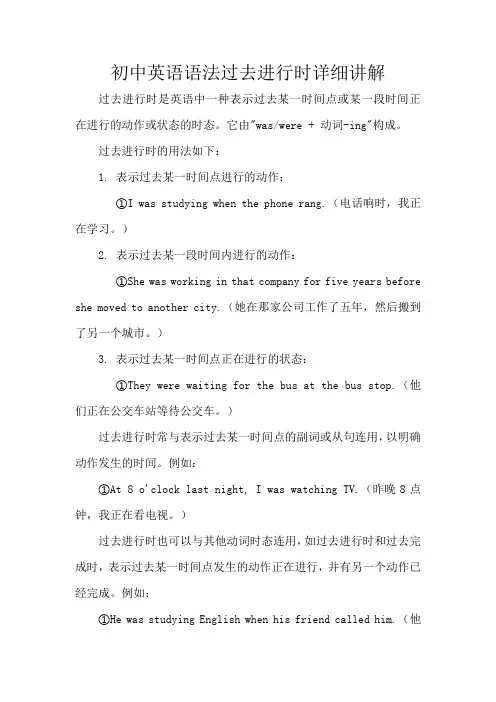
初中英语语法过去进行时详细讲解过去进行时是英语中一种表示过去某一时间点或某一段时间正在进行的动作或状态的时态。
它由"was/were + 动词-ing"构成。
过去进行时的用法如下:
1. 表示过去某一时间点进行的动作:
①I was studying when the phone rang.(电话响时,我正在学习。
)
2. 表示过去某一段时间内进行的动作:
①She was working in that company for five years before she moved to another city.(她在那家公司工作了五年,然后搬到了另一个城市。
)
3. 表示过去某一时间点正在进行的状态:
①They were waiting for the bus at the bus stop.(他们正在公交车站等待公交车。
)
过去进行时常与表示过去某一时间点的副词或从句连用,以明确动作发生的时间。
例如:
①At 8 o'clock last night, I was watching TV.(昨晚8点钟,我正在看电视。
)
过去进行时也可以与其他动词时态连用,如过去进行时和过去完成时,表示过去某一时间点发生的动作正在进行,并有另一个动作已经完成。
例如:
①He was studying English when his friend called him.(他
的朋友给他打电话时,他正在学习英语。
)
需要注意的是,过去进行时并不常用于表示短暂的动作或习惯性的动作。
对于这些情况,一般使用过去简单时。
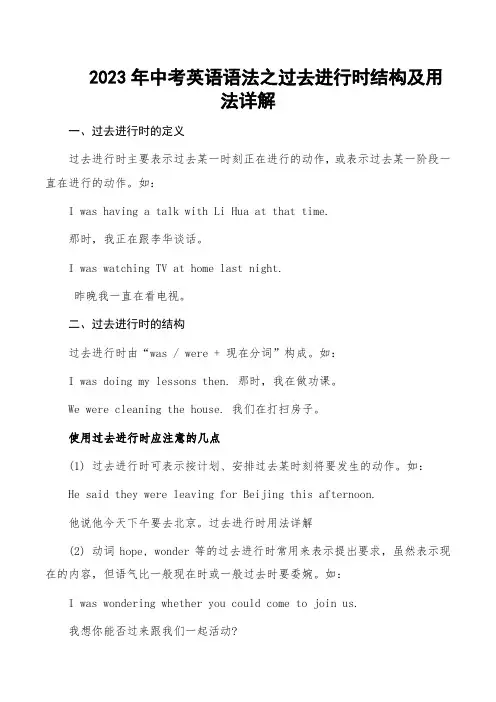
2023年中考英语语法之过去进行时结构及用法详解一、过去进行时的定义过去进行时主要表示过去某一时刻正在进行的动作,或表示过去某一阶段一直在进行的动作。
如:I was having a talk with Li Hua at that time.那时,我正在跟李华谈话。
I was watching TV at home last night.昨晚我一直在看电视。
二、过去进行时的结构过去进行时由“was / were + 现在分词”构成。
如:I was doing my lessons then. 那时,我在做功课。
We were cleaning the house. 我们在打扫房子。
使用过去进行时应注意的几点(1) 过去进行时可表示按计划、安排过去某时刻将要发生的动作。
如:He said they were leaving for Beijing this afternoon.他说他今天下午要去北京。
过去进行时用法详解(2) 动词hope, wonder等的过去进行时常用来表示提出要求,虽然表示现在的内容,但语气比一般现在时或一般过去时要委婉。
如:I was wondering whether you could come to join us.我想你能否过来跟我们一起活动?三、过去进行时的用法(1)表示过去某一时刻正在进行的动作。
动作发生的特定时间常用一个短语或时间状语从句来表明。
I first met Lisa three years ago. She was working at a radio shop at the time.我三年前第一次遇见丽莎时。
她在一家无线电商店工作。
The last time I saw Jane, she was picking cotton in the fields.我最后一次见简,她正在地里摘棉花。
Tom slipped into the house when no one was looking.汤姆溜进了那所房因为当时没人注意他。
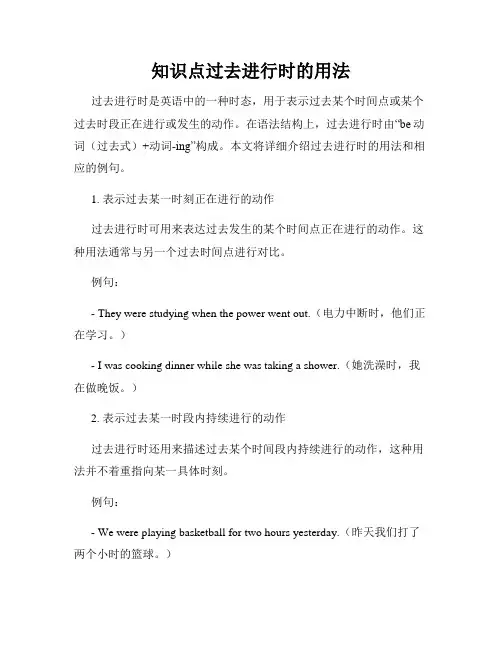
知识点过去进行时的用法过去进行时是英语中的一种时态,用于表示过去某个时间点或某个过去时段正在进行或发生的动作。
在语法结构上,过去进行时由“be动词(过去式)+动词-ing”构成。
本文将详细介绍过去进行时的用法和相应的例句。
1. 表示过去某一时刻正在进行的动作过去进行时可用来表达过去发生的某个时间点正在进行的动作。
这种用法通常与另一个过去时间点进行对比。
例句:- They were studying when the power went out.(电力中断时,他们正在学习。
)- I was cooking dinner while she was taking a shower.(她洗澡时,我在做晚饭。
)2. 表示过去某一时段内持续进行的动作过去进行时还用来描述过去某个时间段内持续进行的动作,这种用法并不着重指向某一具体时刻。
例句:- We were playing basketball for two hours yesterday.(昨天我们打了两个小时的篮球。
)- He was reading a book all evening.(他整晚都在读书。
)3. 表示过去某个时间点的背景动作过去进行时可以用于描述过去的某个时间点,强调其背景下正在进行的动作。
这种用法常常与一般过去时连用,用来提供更完整的背景信息。
例句:- When I arrived at the party, everyone was dancing.(当我到达晚会时,大家都在跳舞。
)- The phone rang while she was having a meeting.(她开会的时候电话响了。
)4. 表示过去愿望和计划过去进行时还可以表达过去的愿望和计划,表示当时的期望或打算。
例句:- I was hoping to visit Paris, but I couldn't afford the trip.(当时我希望能去巴黎,但是支付不起旅费。
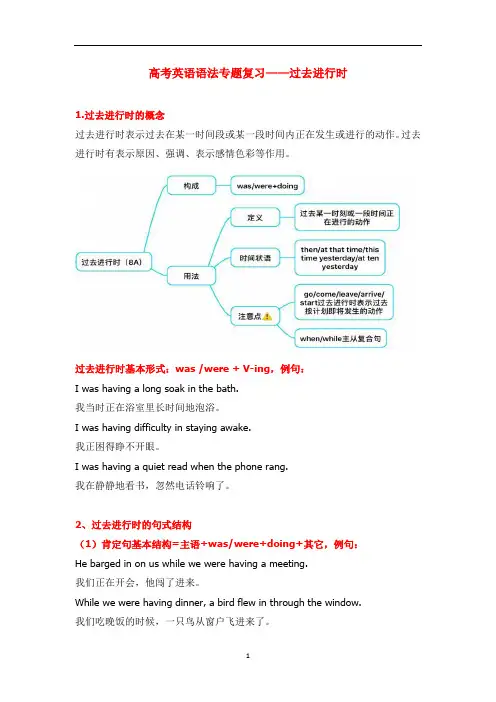
高考英语语法专题复习——过去进行时1.过去进行时的概念过去进行时表示过去在某一时间段或某一段时间内正在发生或进行的动作。
过去进行时有表示原因、强调、表示感情色彩等作用。
过去进行时基本形式:was /were + V-ing,例句:I was having a long soak in the bath.我当时正在浴室里长时间地泡浴。
I was having difficulty in staying awake.我正困得睁不开眼。
I was having a quiet read when the phone rang.我在静静地看书,忽然电话铃响了。
2、过去进行时的句式结构(1)肯定句基本结构=主语+was/were+doing+其它,例句:He barged in on us while we were having a meeting.我们正在开会,他闯了进来。
While we were having dinner, a bird flew in through the window.我们吃晚饭的时候,一只鸟从窗户飞进来了。
She was repairing a glove when I came in.我进去时,她在补手套。
While mother was cooking, father was repairing the bookcase.当妈妈在烧饭时,爸爸在修书架。
The price of gold was going up.黄金的价格上涨了。
The boat was going under fast.小船正迅速下沉。
(2)否定句基本结构=主语+was/were+not+doing+其它,例句:He was not watching TV last night.昨晚他没有在看电视。
His campaign was not going well.他的竞选活动进展得不顺利。
She was not going to give up her hard-won freedom so easily.她不会这么轻易地放弃得来不易的自由。
练习过去进行时的语法规则和技巧2023年了,作为一名英语爱好者,我深知练习语法对于我提高语言水平是至关重要的。
今天,我想分享一下关于过去进行时的语法规则和技巧,希望对于同样学习英语的朋友有所帮助。
一、过去进行时的基本用法过去进行时(Past Continuous Tense)表示过去某个时间正在进行的动作或事情。
它的构成方式是:be动词(was或were)+现在分词(-ing),如:I was watching TV when he came.当他来的时候,我正在看电视。
They were playing basketball at that time.当时他们正在打篮球。
二、过去进行时的构成方式1.肯定式主语+be动词(was或were)+现在分词(动词+ing)例句:I was sleeping when she called.我在她打来电话时正在睡觉。
They were playing soccer when it started to rain.当开始下雨的时候,他们正在踢足球。
2.否定式主语+be动词(was或were)+not+现在分词(动词+ing)例句:I was not watching TV when she came.当她来的时候,我没有在看电视。
They were not playing basketball when I saw them.当我看到他们的时候,他们没有在打篮球。
3.疑问式Be动词(was或were)+主语+现在分词(动词+ing)+?例句:Were you watching TV when she called?她打来电话时你正在看电视吗?Were they playing soccer when it started to rain?开始下雨的时候,他们正在踢足球吗?三、过去进行时的用法1.过去进行时表示一个已经发生的动作中的一部分,和过去简单时一起使用,一般是指一个情境的背景、时间或气氛他正在写信。
英语语法什么是过去进行时过去进行时是英语中的一种时态,用来描述过去某个时间点或时间段正在进行的动作或状态。
它通常由“was/were + 现在分词”构成。
在本文中,我将详细介绍过去进行时的用法、结构、常见例句以及注意事项。
一、过去进行时的用法:过去进行时表示在过去某个时间点或时间段正在进行的动作或状态。
它强调了过去某个时刻的持续性。
过去进行时通常用来描述以下情况:1. 过去某个时间点的持续动作:- I was studying when she called me.(她给我打电话时,我正在学习。
)- They were playing soccer at 3 p.m. yesterday.(昨天下午3点他们在踢足球。
)2. 过去某个时间段的持续状态:- She was living in Paris for two years.(她在巴黎住了两年。
)- We were working on the project all day yesterday.(昨天整天我们都在做这个项目。
)3. 过去的计划或安排:- They were going to the party, but it was canceled.(他们本想去参加派对,但是派对取消了。
)- I was meeting my friend for lunch, but he got sick.(我本来要和朋友吃午饭,但是他病了。
)4. 过去的态度或感受:- She was loving every minute of her vacation.(她度假的每一分钟都很享受。
)- They were hating the rainy weather.(他们讨厌那阴雨连绵的天气。
)二、过去进行时的结构:过去进行时的结构由“was/were + 现在分词”构成。
下面是各种人称和数的过去进行时的构成:1. 肯定句结构:- I was studying.- You were working.- He/she/it was sleeping.- We/you/they were playing.2. 否定句结构:- I was not studying.- You were not working.- He/she/it was not sleeping.- We/you/they were not playing.3. 疑问句结构:- Was I studying?- Were you working?- Was he/she/it sleeping?- Were we/you/they playing?4. 疑问句的否定回答:- Yes, I was./No, I wasn't.- Yes, you were./No, you weren't.- Yes, he/she/it was./No, he/she/it wasn't.- Yes, we/you/they were./No, we/you/they weren't.三、过去进行时的常见例句:下面是一些常见的过去进行时的例句,以帮助你更好地理解其用法和结构:1. They were watching a movie when I arrived.(我到达时,他们正在看电影。
八年级过去进行时知识点过去进行时是英语语法中的一种时态,主要用于描述过去某个时间点正在进行的动作或状态,不同于一般过去时。
在八年级英语学习中,过去进行时也是需要掌握的一个重要知识点。
一、过去进行时的构成:was/were + V-ing过去进行时的构成非常简单,只需将was或were加在动词的现在分词(V-ing)后面即可,例如:- I was watching TV at 8 o'clock last night. 昨晚8点我正在看电视。
- They were playing basketball in the park when it started to rain. 下雨时他们正在公园里打篮球。
二、过去进行时的用法1. 描述过去某一时间正在进行的动作The phone rang while I was having dinner.当我正在吃晚饭时电话响了。
2. 用于加强动作的持续性He was studying for three hours without a break.他连续三个小时都在学习。
3. 描述过去同时发生的两个动作While John was driving to work, he had an accident.约翰在开车上班的路上发生了车祸。
4. 描述过去进行的状态I was feeling tired and hungry after playing basketball all morning.我打了一个上午的篮球后感到又累又饿。
5. 用于表示委婉语气I was just wondering if you could help me with my math homework.我不知道你是否能帮我做数学作业。
三、过去进行时的时间状语表示过去进行时的时间状语有很多种,例如:- at this time yesterday 在昨天这个时间- at 5 o'clock last night 昨晚5点钟- while I was doing my homework 我做作业的时候- at that moment 那个时刻总之,过去进行时是英语语法中非常基础的一个时态,掌握其构成和用法对于八年级的英语学习具有很大的帮助。
过去进行时的用法和句型转换过去进行时是英语语法中的一种时态,用于表示在过去某个时间点或时间段内正在进行的动作或事件。
本文将深入讨论过去进行时的用法和句型转换,以帮助读者更好地理解和运用这个时态。
一、过去进行时的用法1. 表示过去某个时间点或时间段内进行的动作或事件。
例如:- She was studying at the library yesterday.(她昨天在图书馆学习。
)- They were having dinner at 7 p.m. last night.(他们昨晚7点吃晚饭。
)2. 与过去时态连用,表示两个同时进行的动作或事件。
例如:- While I was watching TV, my brother was playing video games.(当我在看电视时,我的弟弟在玩电子游戏。
)3. 描述过去某个时间点或时间段内的反复或持续性动作。
例如:- They were always arguing about trivial matters.(他们总是在为琐事争吵。
)- I was working on that project for months.(我花了几个月的时间在那个项目上工作。
)二、过去进行时的句型转换1. 否定句:在助动词“was/were”后面加上“not”。
例如:- She was not watching TV when I called her.(我打电话给她的时候,她没有在看电视。
)- They were not playing soccer because of the rain.(由于下雨,他们没有踢足球。
)2. 疑问句:将助动词“was/were”提前至主语之前。
例如:- Were you studying at the library yesterday?(你昨天在图书馆学习吗?)- Where were they having dinner at 7 p.m. last night?(他们昨晚7点在哪里吃晚饭?)3. 肯定回答:直接使用“yes”或“yes, + 主语+ was/were”。